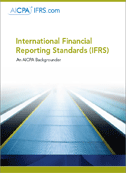WORLDWIDE MOMENTUM
The globalization of business and finance has led more than 12,000 companies in more than 100 countries to adopt IFRS. In 2005, the European Union (EU) began requiring companies incorporated in its member states whose securities are listed on an EU-regulated stock exchange to prepare their consolidated financial statements in accordance with IFRS1. Australia, New Zealand and Israel have essentially adopted IFRS as their national standards. Canada, which previously planned convergence with U.S. Generally Accepted Accounting Principles (GAAP), now plans to require IFRS for publicly accountable entities in 2011. The Accounting Standards Board of Japan (ASBJ) and the International Accounting Standards Board (IASB) plan convergence by 2011. On November 11, 2008, Mexico announced it would adopt IFRS for all listed entities starting in 2012.
In a survey conducted in late 2007 by the International Federation of Accountants (IFAC), a large majority of accounting leaders from around the world agreed that a single set of international standards is important for economic growth. Former AICPA Chairman Randy Fletchall, CPA, and AICPA President and CEO Barry Melancon, CPA, were among those surveyed. Of the 143 leaders from 91 countries who responded, 90 percent reported that a single set of international financial reporting standards was “very important” or “important” for economic growth in their countries (http://www.ifac.org/globalsurvey).
View International Financial Reporting Standards (IFRS) — An AICPA Backgrounder [PDF - 375k]
|
1 Most EU countries currently do not permit use of IFRS in financial statements of privately held companies.

